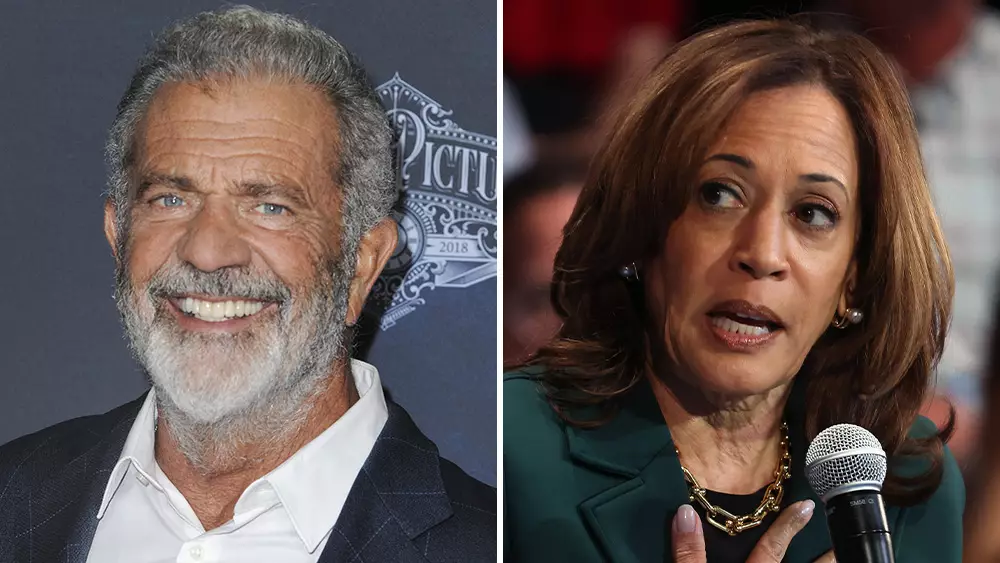In the ever-tangled world of Hollywood, the intersections of art, celebrity, and politics can result in a multitude of viewpoints and relationships. Andrew Garfield recently chose to commend Mel Gibson for his personal growth, calling it “beautiful healing with himself.” In an industry often reluctant to forgive past transgressions, Garfield’s praise could be seen as a moment of solidarity with a figure who has faced numerous controversies. However, Gibson’s recent remarks about Vice President Kamala Harris reveal a jarring disconnect between a personal narrative of redemption and public expression that resurrects his history of offensive comments. As such, it seems important to scrutinize the complexities of this relationship and the implications of Gibson’s public statements.
While Garfield’s commendation of Gibson speaks to the actor’s admiration for artistic vision and personal evolution, it is vital to recognize how Gibson’s recent comments reflect a persisting pattern troubling to many. Caught on camera at LAX, Gibson did not shy away from disparaging comments about Harris, comparing her intelligence to that of “a fence post.” Such declarations echo sentiments expressed by former President Donald Trump, who has often ridiculed Harris, further embedding Gibson in a broader narrative of misogyny and disrespect towards women in power. This kind of commentary raises questions about the sincerity of alleged self-healing when it appears to coexist with harmful ideologies.
Gibson’s past is marred by a series of incendiary incidents that cannot be overlooked, such as his 2006 DUI arrest where he directed antisemitic slurs towards a police officer. Despite his subsequent apologies, the shadows of those actions linger, creating a complicated legacy that taints his reputation. Winona Ryder’s allegations about Gibson’s inappropriate comments at a Hollywood party further illustrate that his behavior may reflect deep-seated prejudices rather than mere slips of character. These incidents are not just footnotes in a celebrity timeline; rather, they illustrate an ongoing struggle within the entertainment industry about accountability and the path to true redemption.
In this ever-challenging climate, Kamala Harris herself has not remained silent on the actions of public figures. Referring to Trump as “increasingly unhinged and unstable,” she draws attention to a larger pattern that many see as a direct threat to democratic values and civil discourse. It is noteworthy that, rather than engaging in reciprocal debate, prominent figures like Gibson often resort to ad hominem attacks, thereby reducing complex political discussions to bitter insults. This movement away from policy and meaningful discussion diminishes the value of civic engagement and instead fosters a culture of divisiveness.
The admiration Garfield expressed for Gibson can be seen as a testament to the allure of artistic genius and the complex relationship viewers and audiences maintain with creators. A director like Gibson, despite a difficult past, can still conjure deep emotional responses through films such as “Hacksaw Ridge.” Yet, the question remains: do we as audiences excuse or overlook personal failures in the face of artistic excellence? At what point does the legacy of an artist’s behavior overshadow their contributions? The cultural weight of arts and entertainment necessitates that we critically examine the messages shared by those in the limelight and take responsibility for the repercussions of their words.
As we navigate the often-turbulent waters of public sentiment surrounding celebrities like Mel Gibson, the echoing words of Andrew Garfield serve as a reminder of the dualities embedded within our respect and critique of public figures. Artistic merit and personal conduct are two sides of the same coin; to appreciate one is not to disregard the other. In seeking healing and redemption, it is crucial for both creators and audiences to engage deeply with the implications of our words and choices—a dialogue that deserves ongoing scrutiny as society strives for a more respectful and inclusive future.

Leave a Reply